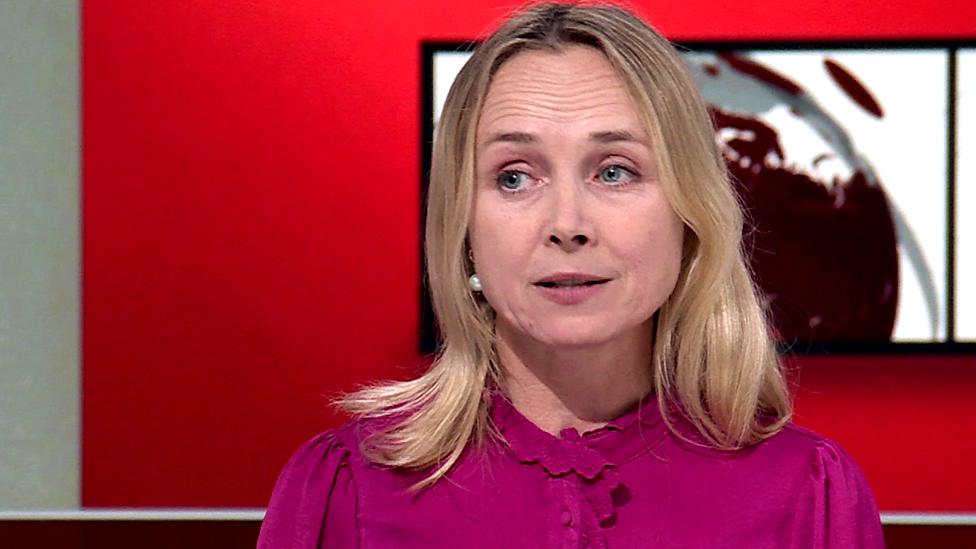Huw Edwards: How Sun story about BBC presenter developed
- Published
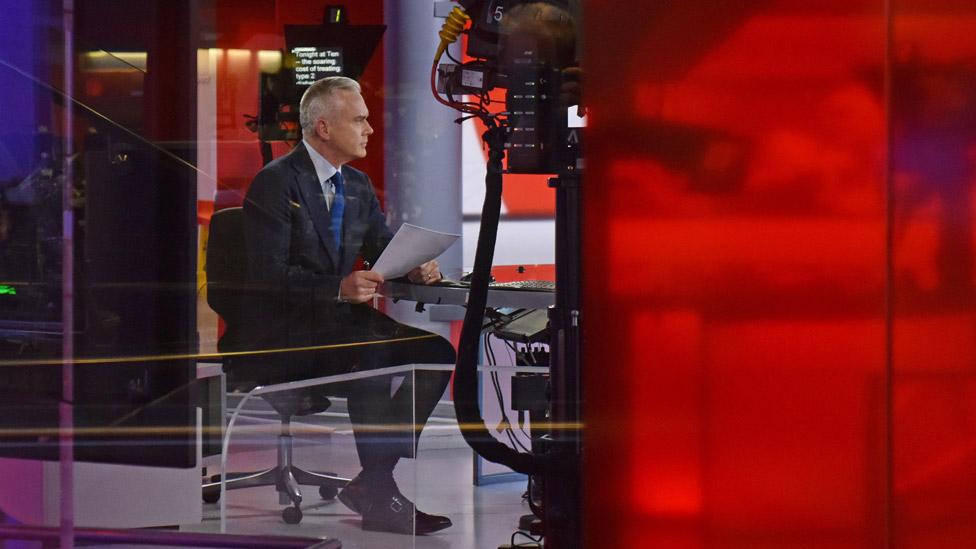
One week on from the Sun's first allegations about Huw Edwards, there are still major questions and unresolved details about the six chaotic days of claim and counter-claim.
The Sun's telling of the story subtly shifted over the week, particularly in the prominence given to one crucial detail, which has left it facing serious questions.
The media faced an almighty balancing act between privacy and the public interest in reporting claims of serious wrongdoing. BBC News examined more than 40 online stories, as well as print editions of the Sun and other papers, to look at how the media - including the BBC itself - handled the most complex aspects of the story.
One key phrase
It all began with a story in the Sun last Friday, external, a story that featured a very important phrase.
The paper said that a high-profile BBC presenter had given a young person "more than £35,000 since they were 17 in return for sordid images".
Wording to this effect was used at least seven times online over the next three days, out of dozens of articles published on the subject by the Sun.
That line rang alarm bells among readers and the media, partly because it hinted at criminality.
It suggested the man - who we now know is Edwards - may have committed a criminal offence, if such images were sent before the teenager was 18.
Other outlets including the Sunday Times and BBC News made that connection explicitly, and it was one factor that fuelled the story.
It is worth saying Edwards has not yet addressed this, or any of the further claims that emerged during the past week. In her statement on Wednesday, his wife Vicky Flind said he would respond to the allegations when he is well enough. He will stay in hospital for the "foreseeable future" after recent events triggered a "serious" mental health episode, she said.
On Sunday evening, in an editorial, external, the Sun began to refer to "contact" between the pair having started when the young person was 17, but did not specify what the nature of that contact was.
The last time the Sun used the key phrase with the direct allegation (that the young person had been paid for "sordid images" since they were 17) online was on Monday evening.
This was when it reported on a letter, external from the young person's lawyer to the BBC denying the substance of the Sun's story, and their parents' response, which formed the basis of a story in the following day's paper. This print story also repeated the phrase.
The publication of this letter, which was adamant that "nothing unlawful" had taken place, might have changed the equation.
For example, after this an online Sun editorial on Tuesday, external evening made no mention of the age the payments started or what the money was for. On Wednesday the paper stated, external the young person was 17 when they first received money, but did not say it was for explicit images.
The Sun has said the story was "always squarely in the public interest".
Its statement on Wednesday, after Edwards was named by his wife, said its original story did not allege criminality and further added that connection was only made by other outlets.
"From the outset, we have reported a story about two very concerned and frustrated parents who made a complaint to the BBC about the behaviour of a presenter and payments from him that fuelled the drug habit of a young person." it said.
That initial story did not explicitly mention criminality but, if the details within it were correct, then it suggested the presenter had broken the law.
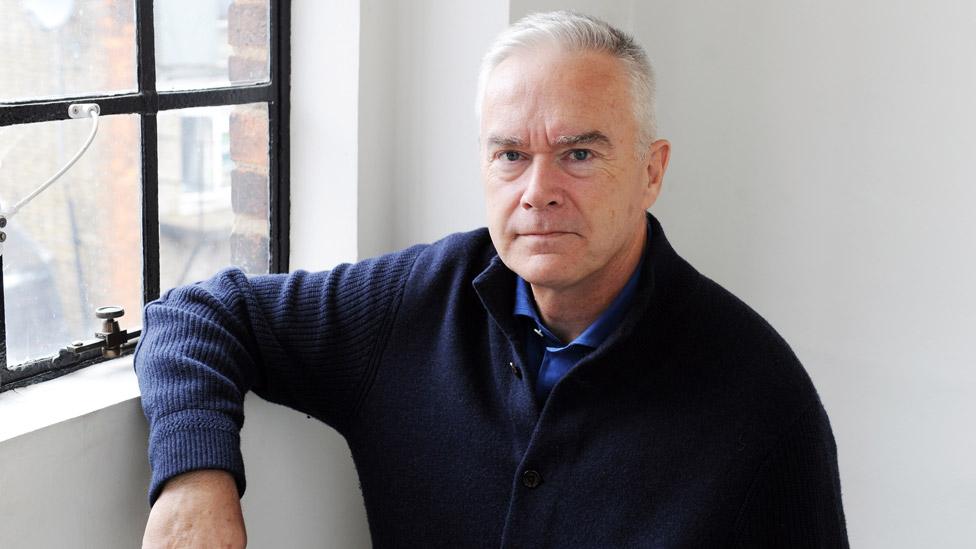
Questions remain about how the media, including BBC News, covered the story about Edwards, pictured here in 2018
The paper also followed up comments in the Sunday Times from, external former chief crown prosecutor Nazir Afzal, who said that the presenter could potentially be charged with sexual exploitation under the Sexual Offences Act 2003.
Its resulting story, external was headlined: "Top BBC star who 'paid child for sex pictures' could be charged by cops and face years in prison, expert says."
The Sun was approached for this story but did not wish to comment further, referring BBC News to its statement issued on Wednesday.
Questions about evidence
While its first story reported claims from the young person's mother, it is not clear whether the Sun had seen evidence proving the allegations before publishing.
Did Sun journalists see and verify bank statements allegedly containing payments from the star, or the so-called "sleazy" messages?
Or were they relying on the family member's word? The paper said family members had signed a sworn affidavit when sharing their story.
It is not clear what the Sun meant by this, as an affidavit is a document overseen by a solicitor for use in legal action.
On Monday, in response to the young person's denial, the Sun said in a statement that it had seen evidence supporting their family's concerns.
A dossier of evidence has reportedly been passed by the family to the BBC, but BBC News has not seen its content, nor any of the Sun's evidence.
Backed up by a legal affidavit or not, this account was to be firmly challenged by the young person at the heart of the allegations.
The denial
The letter from the young person's lawyer, sent to the BBC on Monday evening, called the allegations "rubbish" and said "nothing inappropriate or unlawful" had taken place.
Furthermore, it said the young person had sent a denial to the paper on Friday evening via WhatsApp, saying their mother's account was "totally wrong and there was no truth to it", but the "inappropriate" article was still published.
But if the paper received a denial, many asked why it was not published, as is routine journalistic practice?
With the young person's lawyers dismissing the claims, and no response yet from the unnamed presenter, eyes were on the BBC and police to investigate.
The police speak
On Monday, the BBC met the Metropolitan Police, who advised it to pause its investigation while police made enquiries.
Meanwhile, the Sun had published an interview with the parents, external who said the BBC were liars and that they had told the BBC about the presenter's contact with the young person.
The BBC has published a timeline of events and director general Tim Davie has said it is handling the situation "responsibly and judicially".
The parents also told the Sun they had referred the matter to a police force, who told them there was no criminal case to answer.
We now know two forces have concluded there was no evidence of criminality.
South Wales Police - who the young person's parents first approached in April - said the allegation related to "the welfare of an adult", as opposed to a child.
On Wednesday evening the Metropolitan Police said there was no information to indicate a criminal offence and they would take no further action.
Media critics were quick to point out that this cast the story - and the balance between public interest in publishing the allegations and the presenter's right to privacy - in a very different light.
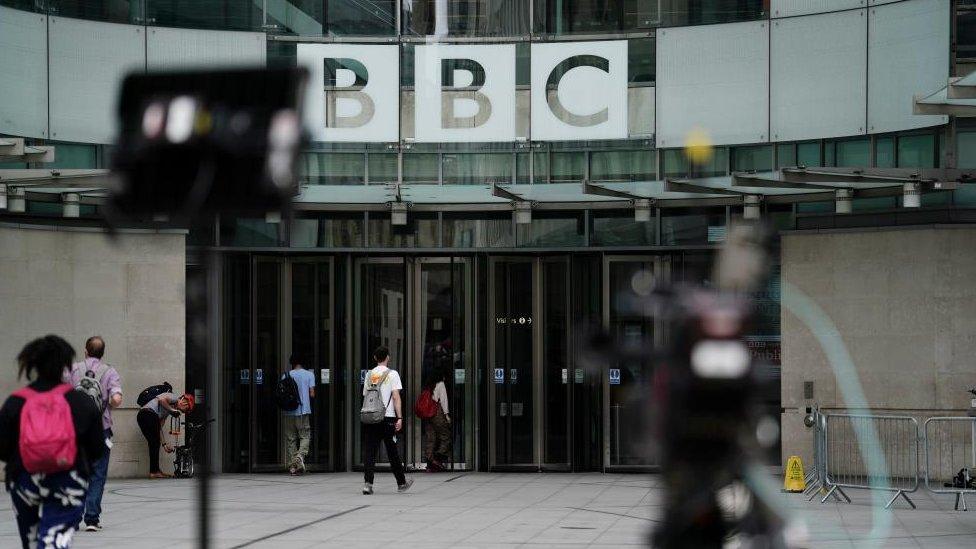
Jacqui Hames, a board member of press campaign group Hacked Off, said a "suggestion of criminality... screamed out" at readers day after day.
In the Sun's statement later that evening, reiterating that it did not initially allege criminality, it said its claims "were always very serious".
Former Sky News anchor Adam Boulton called the question of illegality "a side issue".
"The issue is behaviour that many people would - potentially if it's true - disapprove of," he told Newsnight.
Investigating further allegations
Meanwhile, in the wake of the Sun's story, journalists began investigating the presenter and further allegations about his behaviour began to emerge.
BBC News told the story of one young person who claimed they were placed under repeated pressure to meet the presenter after first being contacted anonymously by him on a dating app. They said they received abusive and menacing messages from Mr Edwards that left them frightened after they hinted online they might reveal his name.
Separately, the Sun said the presenter broke Covid lockdown rules, external to meet a 23-year-old who he had contacted on a dating site.
The paper also published messages it claimed, external were from the star to a 17-year-old on Instagram, including love heart emojis.
Shortly after Edwards was named by his wife, BBC News reported that three current and former employees claimed Edwards had sent messages that made them uncomfortable.
These alleged interactions raise questions about whether there was an abuse of power, and whether it would be acceptable behaviour for one of the BBC's highest-paid presenters and someone the nation is asked to trust during coverage of both the daily news and major national events.
Questions for the BBC
The Sun said the young person's parents only approached the paper after taking their concerns to the BBC.
In mid-May, they spoke to the BBC customer services team, who passed them to the corporate investigations unit, which investigates alleged criminal and illicit activity involving BBC staff.
We don't know exactly what these allegations were - the BBC has said they were "very serious" but not illegal, and different to those reported by the Sun.
The investigations unit sent the parents one email and tried to phone them once in the subsequent seven weeks.
Was that a sufficient response to a "very serious" complaint about one of the BBC's biggest names?
"That's a fair question," Mr Davie, director general, said when asked on BBC Radio 4.
He also promised to "immediately" review how quickly "red flags" are raised internally after such complaints.
The BBC has also said no executive directors were made aware until the Sun approached the corporation late last week.
Some have questioned why the BBC did not discuss the allegations with Edwards earlier and give him a chance to respond - he was only made aware of the claims last Thursday. But Mr Davie has said: "You don't take that complaint directly to the presenter unless it has been verified."
The decision to air fresh claims of inappropriate messages from BBC colleagues - on the day of Edwards' wife's statement - has also been criticised. The Sun said it would not publish any further allegations.
Sir Craig Oliver, former editor of the BBC News at Ten - the programme Edwards has fronted for so long - said the corporation's journalists had mostly done a good job, but "in the desire to make sure that they look like they're covering this in a fair and impartial way, they perhaps have gone too far".
Questions for the media
Edwards' wife made clear the impact of the days of fevered reporting and speculation on her family - and that will be a weighty factor as the debate develops about the balance between publishing in the public interest versus the right to privacy.
Her statement "acted like a dash of cold water to the face of all journalists", Sir Craig told BBC Radio 4's Today programme.
"I think both the BBC and the Sun are now looking at themselves and asking themselves questions about: is it possible in a frenzied environment where there are so many different elements coming together and it's making people's heads spin... can you, in that environment, have a duty of care to the person involved? And can you allow due process to take place?"
Former ITN editor-in-chief Stewart Purvis said it raised questions around when it is legitimate to report on the private life of a high-profile individual.
But Mark Damazer, a former controller of BBC Radio 4 and Radio 7, said on Thursday that BBC News journalists had used "reasonable judgement" to cover the story as they would any other.
BBC News was willing to "try and give the BBC an extremely good kicking, especially the boss class", he said - because it did not want to be accused of being "soft" on the wider BBC.
Related topics
- Published13 July 2023
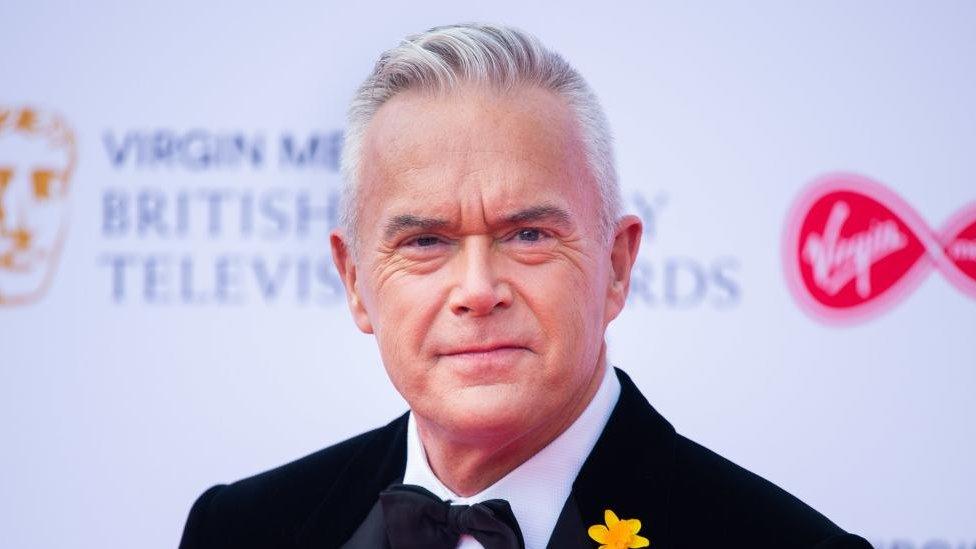
- Published22 April 2024
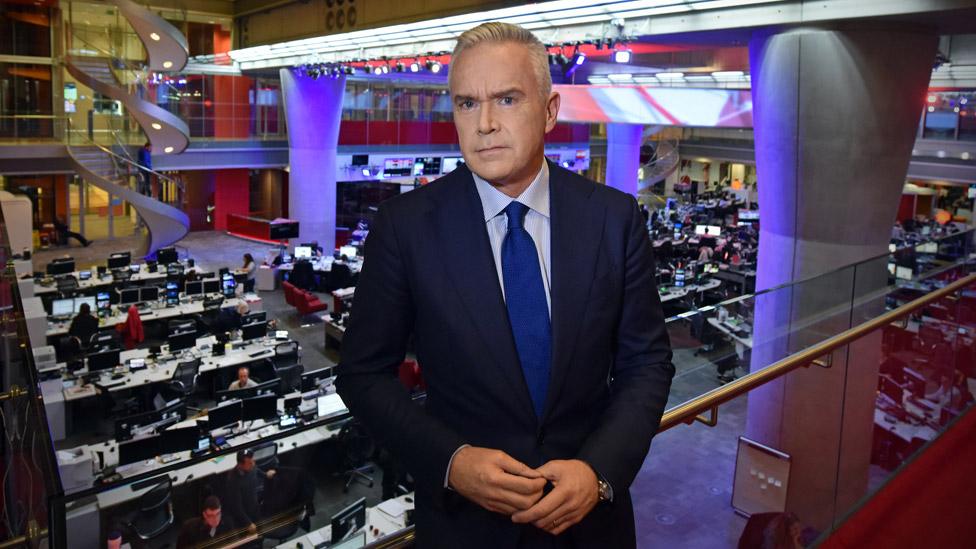
- Published22 April 2024
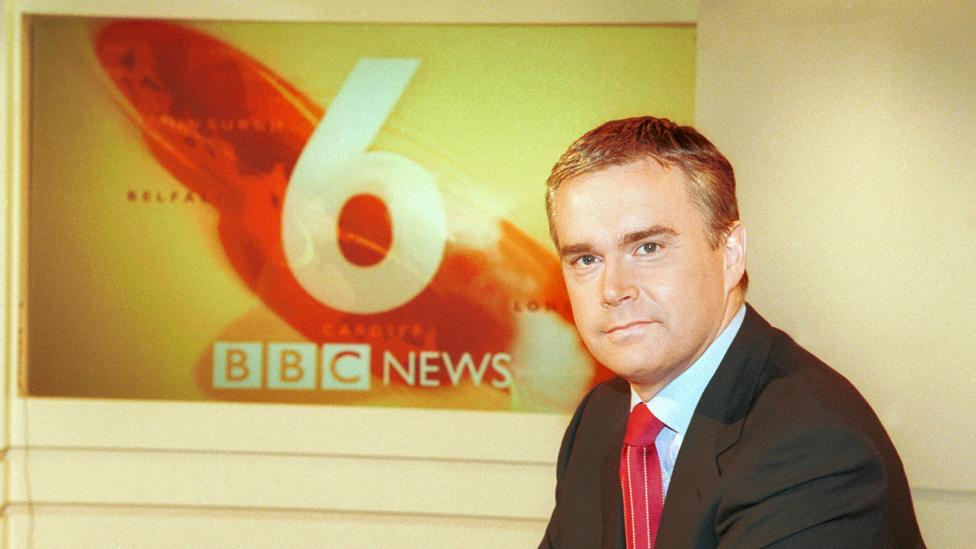
- Published12 July 2023
